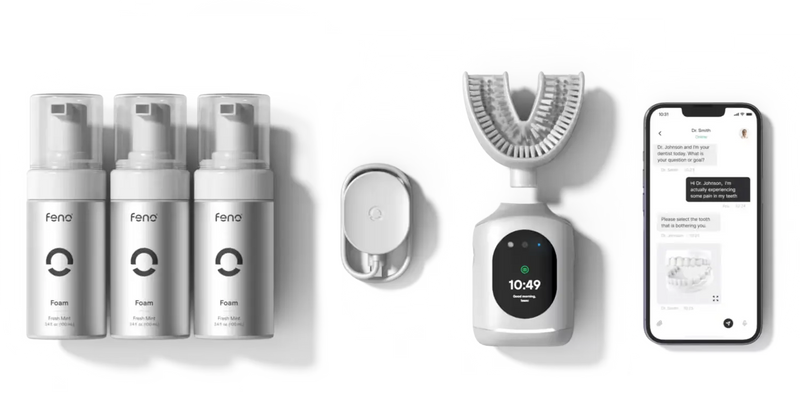
Vitamins And Minerals Essential For Gum Health
Essential Takeaways
- A balanced diet rich in vitamins and minerals is crucial for maintaining healthy gums and teeth.
- Vitamin C is essential for collagen production and gum repair, while its antioxidant properties help prevent inflammation.
- Vitamin D enhances calcium absorption, strengthening both teeth and gum tissues, and is obtained via sunlight and dietary sources.
- Calcium and phosphorus work synergistically to fortify enamel and support the structural integrity of gums.
- Vitamins A and E protect mucous membranes and reduce oxidative stress, promoting overall gum health.
- Prioritize natural food sources and consult healthcare providers for proper supplementation.
Good nutrition is fundamental to maintaining healthy gums and teeth. The food and nutrients we consume have a direct impact on our oral health, influencing the strength of our teeth and the integrity of our gums. Without the right nutrients, our oral tissues can weaken, making them more susceptible to diseases such as gingivitis and periodontitis. To ensure robust oral health, it's essential to focus on a diet that supports gum and tooth health, incorporating a variety of vitamins for healthy gums and teeth and minerals that are specifically beneficial for maintaining the oral cavity in top condition.
Vitamin C: Essential for Collagen Formation
Role of Vitamin C in Gum Health
Vitamin C is crucial for the health of your gums, mainly because it's a key factor in collagen production, a protein that helps maintain the strength and integrity of your gums. Collagen supports the soft tissues in your mouth, keeping them robust and resilient against infections. Adequate intake of vitamins for gum health, like Vitamin C, can help prevent the breakdown of gum tissues, reducing the risk of gum recession and periodontal diseases.
How Vitamin C Prevents Gum Disease
Its antioxidant properties are vital in combating the damage caused by free radicals, which can lead to oxidative stress and inflammation in gum tissues. This nutrient helps in healing and repairing the gums. Regular consumption of adequate Vitamin C strengthens the gums’ defense mechanisms, effectively curbing the onset and progression of gum disease.

Natural Sources of Vitamin C
Citrus fruits like oranges, grapefruits, and lemons are especially rich in Vitamin C, a key reason why they are often recommended for regular consumption. However, the list of Vitamin C-rich foods extends well beyond citrus. Strawberries and kiwis, for instance, are fruits that are not only delicious but also contain high amounts of this essential vitamin. Vegetables such as bell peppers—in colors ranging from green to red and yellow—offer impressive amounts of Vitamin C, sometimes surpassing the levels found in citrus fruits.
Regular intake of Vitamin C through natural sources is preferable to supplementation as it ensures the absorption of a broad range of complementary nutrients. For example, eating a whole orange provides Vitamin C along with dietary fiber, which aids in digestion and helps manage blood sugar levels. To maximize the intake and retention of Vitamin C, it is beneficial to consume these foods raw or lightly cooked, as prolonged exposure to heat and water can reduce their vitamin content.
Recommended Daily Intake
The recommended daily intake of Vitamin C varies by age, sex, and life stage. Generally, adults should aim for 65 to 90 milligrams per day, with an upper limit of 2,000 milligrams. For those who struggle to obtain sufficient Vitamin C from their diet, supplements may be a practical option. However, it's best to consult with a healthcare provider before starting any supplementation to ensure it's necessary and to determine the appropriate dosage to support vitamins for dental health without exceeding safe limits.
Vitamin D: The Sunlight Vitamin and Gum Health
Importance of Vitamin D
Vitamin D is essential not just for bone health but also for your gums and teeth. It facilitates the absorption of calcium, which is critical for maintaining the structural integrity of both teeth and gum tissue. Without sufficient vitamins for teeth and gums, like Vitamin D, calcium cannot be effectively absorbed and utilized, potentially leading to weaker teeth and undernourished gum tissues. Ensuring adequate Vitamin D levels helps maintain a balance necessary for oral health. Higher levels of Vitamin D are associated with reduced rates of gum inflammation and fewer symptoms of periodontal disease. By enhancing immune competence, Vitamin D helps sustain vitamins for healthy teeth and gums, acting as a preventative agent against oral pathogens.
Sources of Vitamin D
It is unique among vitamins because it can be synthesized in the skin with exposure to sunlight and obtained from certain foods and supplements. Here's a detailed look at the various sources of Vitamin D:
- Sunlight: Exposure to sunlight is the primary and most natural method for the body to produce Vitamin D. When the skin is exposed to UVB rays from the sun, it triggers Vitamin D synthesis. However, the amount of Vitamin D synthesized can vary greatly depending on the time of day, season, latitude, skin pigmentation, and sunscreen usage. Typically, a few minutes of sun exposure on the hands, face, and arms two to three times a week is sufficient for most people to produce the necessary Vitamin D levels.
- Fatty Fish: Consuming fatty fish is an excellent dietary method to increase Vitamin D intake. Fish such as salmon, mackerel, and tuna are among the best sources, with a single serving of cooked salmon providing nearly all the daily recommended intake of Vitamin D. This makes fatty fish an invaluable component of a diet aimed at improving bone health, enhancing immune response, and preventing Vitamin D deficiency.
- Fortified Foods: Many foods in the market are fortified with Vitamin D to help prevent widespread deficiency. These include dairy products like milk and yogurt, cereals, and plant-based alternatives such as soy milk and orange juice. Fortification of foods provides an essential source of Vitamin D, especially in areas with limited sunlight and for individuals who have dietary restrictions that limit the consumption of other Vitamin D-rich foods.
- Egg Yolks: Eggs, specifically the yolks, are a good source of Vitamin D, making them especially valuable for those who regularly consume eggs. While they provide a smaller amount compared to fatty fish and fortified foods, egg yolks can still contribute significantly to the daily Vitamin D intake, particularly when used regularly in various dishes.
- Supplements: Vitamin D supplements are a practical and reliable source of this nutrient, especially crucial during the winter months in northern latitudes where sunlight is scarce. They are also beneficial for individuals with absorption difficulties or dietary restrictions that prevent them from obtaining enough Vitamin D through sunlight or food. Supplements come in various forms, such as capsules, tablets, and liquids, allowing for flexibility in dosage and administration.
The importance of Vitamin D cannot be overstated, as it plays a critical role in numerous bodily functions beyond just bone health. Ensuring an adequate intake through these sources can help maintain overall health and prevent the various conditions associated with Vitamin D deficiency.
Guidelines for Vitamin D Supplementation
When natural sources are not enough, supplements can help maintain optimal Vitamin D levels. The general recommendation for adults is 600-800 IU per day, but this might increase based on individual health factors and existing Vitamin D levels. It is important to monitor blood levels when using supplements to avoid toxicity. As emphasized before, consulting with a healthcare provider can provide personalized guidance, ensuring that supplementation effectively supports vitamins for stronger teeth and overall health without exceeding safe intake levels.
Calcium and Phosphorus: Building Blocks for Teeth and Gums
Importance of Calcium in Gum and Tooth Health
This mineral helps fortify the enamel, the outermost layer of the teeth, protecting them from decay and erosion. Additionally, calcium is vital for maintaining the strength and resilience of the gum tissue, supporting the structures that hold teeth in place. Adequate calcium intake is indispensable for long-term dental health.
Role of Phosphorus
Phosphorus, another essential mineral, works in tandem with calcium to optimize oral health. It aids in the formation of teeth and bones by helping the body utilize and store calcium effectively. Phosphorus is also involved in the repair and maintenance of tissues and cells, which is crucial for the regeneration of gum tissue affected by any form of damage or disease, making it an essential component of vitamins for gum disease prevention.

Dietary Sources and Incorporation Strategies for Gum-Healthy Nutrients
A diverse and balanced diet is key to ensuring your gums receive the vitamins and minerals they need for optimal health. Calcium and phosphorus are two minerals essential for healthy bones and teeth, among other bodily functions. To ensure you are getting enough of these vital nutrients, consider incorporating the following dietary sources into your meals:
- Dairy Products: Milk, cheese, and yogurt are not only high in calcium but also contain significant amounts of phosphorus, making them excellent choices for maintaining bone health. For instance, a single cup of milk can provide about 300 mg of calcium, which is about 30% of the recommended daily intake for most adults. These dairy products are also versatile, easily included in various dishes or consumed on their own.
- Leafy Greens: Dark leafy greens like spinach, kale, and collard greens are nutritious sources of calcium. Though not as concentrated in calcium as dairy products, these vegetables offer additional health benefits, including high levels of vitamins, minerals, and fiber. For example, one cup of cooked collard greens contains about 266 mg of calcium. Leafy greens can be a great dietary addition for those following a vegan diet or those who are lactose intolerant.
- Fish: Canned fish such as salmon and sardines, especially those with bones, are rich sources of both calcium and phosphorus. A can of sardines can provide about 35% of the daily recommended intake of calcium and nearly the same amount of phosphorus. This makes canned fish a dual-benefit food, ideal for boosting both of these crucial minerals in your diet.
- Nuts and Seeds: For phosphorus intake, nuts and seeds like almonds and sunflower seeds are beneficial. Almonds, for instance, contain about 136 mg of calcium and 270 mg of phosphorus per ounce. They are a healthy snack that can be easily incorporated into diets and are especially valuable for those looking for non-dairy sources of these minerals.
- Legumes: Beans and lentils are excellent sources of both calcium and phosphorus, which contribute to their profile as nutritional powerhouses. A cup of cooked lentils, for example, provides about 51 mg of calcium and 356 mg of phosphorus. Legumes are not only affordable and widely available but also versatile in cooking, making them easy to add to a variety of dishes.
Incorporating these foods into your diet can significantly contribute to meeting your daily needs for calcium and phosphorus, supporting not just bone health but also a variety of other physiological functions. Regular consumption of these foods can help ensure a balanced intake of essential minerals, supporting overall wellness and disease prevention.
Balancing Calcium and Phosphorus Intake
A balanced ratio is crucial for optimal bone and tooth health. Generally, adults need about 700 mg of phosphorus and 1,000 mg of calcium per day. However, individual needs may vary based on age, gender, and health conditions. Regularly consuming foods that provide both minerals can help maintain this balance, ensuring that both teeth and gums remain healthy. This strategy is integral to a holistic approach to oral health vitamins, emphasizing the synergy between various nutrients for optimal oral wellness.
Vitamin A: Maintaining Mucous Membranes
Benefits of Vitamin A for Oral Mucosa
This vitamin helps create and repair mucous membranes, which are vital for forming a barrier against bacteria, thereby reducing the risk of gum infections. Adequate levels of Vitamin A contribute to the overall health and resilience of gums. Moreover, it supports the salivary glands in the mouth, which play a key role in cleaning teeth and neutralizing harmful acids that can cause tooth decay.
Signs of Vitamin A Deficiency
Common symptoms include dry skin, night blindness, and a reduced ability to fight infections. In the context of oral health, signs such as dry mouth, swollen gums, and frequent gum infections may indicate inadequate Vitamin A levels. Addressing these signs through diet or supplementation can help restore the necessary levels to support the mucous membranes in the mouth, thereby enhancing overall oral health and continuing the support for vitamins good for teeth.
Vitamin E: Antioxidant Protection for Gums
How Vitamin E Benefits Gum Health
Vitamin E is renowned for its powerful antioxidant properties, which are essential for maintaining the health of gum tissues. This vitamin helps to protect the cells in the gums from damage caused by free radicals, which are often a precursor to inflammation and gum disease. By strengthening the cellular walls of the gums, Vitamin E plays a critical role in preserving the integrity of gum tissues and enhancing their capacity to repair and regenerate.
Antioxidant Properties of Vitamin E
The antioxidant effects of Vitamin E are crucial in reducing oxidative stress within the oral cavity, which can lead to cellular damage and a weakened immune response. By mitigating these effects, Vitamin E helps maintain a healthy oral environment, reducing the risk of infections and promoting faster healing of gum tissues. This protective role makes Vitamin E an invaluable component of the best vitamins for gums, helping to sustain their health.
Using Vitamin E in Oral Care
Applying Vitamin E oil directly to the gums can soothe inflammation and aid in the healing of gum tissue. This method is especially useful after dental procedures or when experiencing gum irritation. Furthermore, some dental care products, such as toothpaste and mouthwash, are now formulated with Vitamin E to enhance their gum-protective properties.
Consequences of Vitamin and Mineral Deficiencies
Deficiencies in key vitamins and minerals can have profound and often detrimental effects on oral health, particularly the condition of teeth and gums. When the body lacks essential nutrients, such as vitamin C, vitamin D, calcium, phosphorus, or B vitamins, the structural integrity and resilience of oral tissues are compromised. For example, insufficient vitamin C impairs collagen production, leading to weakened gum tissue that is more susceptible to inflammation, bleeding, and even gum recession or periodontal disease. A lack of vitamin D and calcium can undermine the mineralization of teeth and jawbones, increasing the risk of tooth decay, loose teeth, and bone loss around the gums. Similarly, inadequate intake of B vitamins or vitamin K can result in delayed healing, frequent mouth sores, and excessive gum bleeding. Over time, these deficiencies not only increase the risk of developing gum disease and tooth loss but may also exacerbate existing oral health conditions, making recovery more challenging. Addressing nutritional gaps is therefore crucial, not just for preventing cavities and gum problems, but also for supporting the body’s natural ability to repair and defend oral tissues. Maintaining balanced levels of these nutrients is a foundational step toward long-term oral wellness.
Supplements and Probiotics for Gum and Oral Health
In addition to essential vitamins and minerals, certain dietary supplements and probiotics have gained attention for their potential to support gum and oral health. Omega-3 fatty acids, commonly found in fish oil supplements, possess notable anti-inflammatory and antibacterial properties. Research suggests that omega-3s may help reduce gum inflammation, improve connective tissue attachment, and even decrease plaque levels in individuals with periodontal disease. Coenzyme Q10 (CoQ10), an antioxidant produced naturally in the body, has also been studied for its oral health benefits. Supplementation with CoQ10 may reduce gum inflammation and bleeding, and enhance the antioxidant defense system within gum tissues. Melatonin, best known for its role in regulating sleep, has demonstrated anti-inflammatory and antioxidant effects that may protect gum tissue and promote healing, particularly in individuals with underlying gum disease.
Green tea and its extracts are rich in polyphenols, which may help inhibit the growth of harmful oral bacteria, reduce inflammation, and support overall gum health. Probiotic supplements, especially those containing specific strains like Lactobacillus reuteri, have shown promise in rebalancing the oral microbiome by introducing beneficial bacteria, thereby reducing pathogenic bacteria associated with gum disease. Together, these supplements and probiotics represent a complementary approach to traditional oral care, offering targeted support for maintaining healthy gums and a balanced oral environment.

Considerations for Supplement Use
When deciding whether to use vitamin and mineral supplements for maintaining gum health, several important factors should be considered. Assess your current diet and lifestyle—supplements are generally intended to fill nutritional gaps, not replace a balanced, nutrient-rich diet. Individuals who follow restrictive diets, have food allergies, or experience malabsorption issues could benefit from supplementation. Age, health conditions, and certain life stages can also increase nutritional needs, potentially making supplements more necessary. Geographic and seasonal factors may play a role, too; for example, people with limited sun exposure might require vitamin D supplements. It’s also important to consider the potential for overconsumption, as excessive intake of some vitamins and minerals can be harmful. Not all supplements are created equal; quality, dosage, and bioavailability can vary between brands and formulations. Additionally, some supplements may interact with medications or other health conditions, so it is essential to review these factors. Ultimately, supplementation may be necessary when dietary intake alone cannot meet your body’s needs or when blood tests reveal specific deficiencies. Making an informed decision about supplement use involves evaluating your unique circumstances and, when in doubt, seeking guidance from a qualified healthcare professional.
Taking active steps to incorporate these essential nutrients into your daily life will not only improve your oral health but also enhance your general well-being. Whether through adjustments to your diet or appropriate supplementation, prioritizing these vitamins and minerals will help you maintain strong, healthy gums and a vibrant smile. Pursue a balanced diet, consult with healthcare providers when necessary, and remember that your oral health is a vital part of your overall health journey.

Feno Founders Edition Bundle
Advanced Oral Health in 20 Seconds with the Feno Smartbrush™
Get Yours Now!





